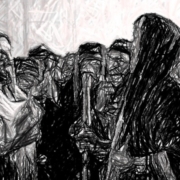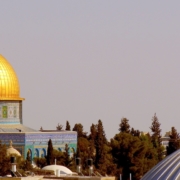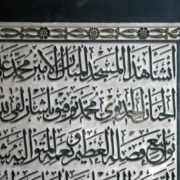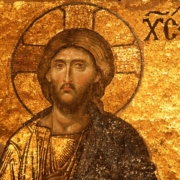A Prophet of God’s Justice: Reclaiming the Political Jesus (Part 2.2)
Chris Marshall | Tuesday, 9th June 2015
Read the previous part of this series here.
In the previous instalment, Chris began by describing Jesus' two-fold political strategy as the prophetic denunciation of the injustices and social evils of the prevailing social order on the one hand, and the calling together of an alternative community to live according to the standards of God’s kingdom of justice and peace on the other. He also discussed two aspects of this strategy—1. a rejection of social discrimination, and 2. a critique of economic exploitation. Here Chris continues his discussion of aspects of Jesus' political strategy.
JESUS’ TWO-FOLD POLITICAL STRATEGY (continued)
3. A mistrust of governmental power: The ministry of Jesus was conducted in the context of an occupied country. Ultimate power resided in Rome but indigenous rulers were allowed to exercise jurisdiction over their own territories, as long as they did so in the interests of the empire. In Jesus’ day, Galilee was controlled by Herod Antipas, while Judea was controlled by a Roman Governor, Pontius Pilate, although internal affairs were administered by the Jewish Sanhedrin.
As a result, Jesus was confronted by three main forms of institutional or political power: the spiritual and domestic authority of the Jewish religious leaders, the civil authority of Herod and the Herodians, and the imperial and military authority of Rome. And he was critical of the way all three exercised their power.[1] The basic presupposition of his political critique was that sovereignty or kingship belongs exclusively to God. God alone possesses ultimate authority in human affairs, and God’s justice must be the measuring rod against which the exercise of all human authority is to be evaluated.
(i) Throughout his ministry Jesus was frequently opposed by Jewish religious leaders, both scribal and priestly. Jesus responded to their opposition with blistering denunciations of their conduct and role in society.[2] The most extensive example of this is found in Matthew 23. A careful reading of this chapter shows that it was not their theological views Jesus objected to; it was their misuse of religious power to entrench injustice. They used God’s law to “lock people out of the kingdom of heaven” and to overburden the weak without lifting a finger to help (vv 1–4,13–16). They abused their sacred trust to accrue personal prestige and kudos (vv.5–7). They presented themselves as paragons of virtue, but were full of extortion and greed within (v 25). They condemned the violence of the past, but were more than ready to shed innocent blood themselves (vv 23–39). Most tellingly, they majored on legal minutiae at the expense of what matters most to God: justice, mercy and faithfulness.
Woe to you, scribes and Pharisees, hypocrites! For you tithe mint, dill, and cumin, and have neglected the weightier matters of the law: justice and mercy and faith. It is these you ought to have practiced without neglecting the others. You blind guides! You strain out a gnat but swallow a camel! (Matt 23:23–24).
(ii) The Herodian elite were also threatened by Jesus and sought to destroy him (Mark 3:6; cf. 12:15). When some sympathetic Pharisees warn Jesus that Herod Antipas is out to kill him, Jesus sends a message of defiance back to “that fox” (Luke 13:31–33). Later when tried by Herod, he refuses to co-operate with his interrogation (Luke 23:6–12).
(iii) Jesus was also critical of Roman power. It is true that Jesus never voiced direct opposition to Roman rule, and he never called for the violent expulsion of the Romans from the holy land. But this does not mean that he was indifferent to Roman control or secretly approved of it. Several considerations show he was not detached from this issue. To begin with, Jesus’ entire mission presupposed a repudiation of the Roman boast that they had already introduced the Golden Age of “peace and stability”. His proclamation of the kingdom of God was tantamount to a rejection of the Pax Romana [“Roman peace”] as the order God intended. As Wengst observes, “anyone who prays for the coming of the kingdom of God, expects it very soon, and sees the sign of its dawning in his own action, has no faith in the imperial good tidings of a pacified world and human happiness in it; he does not regard this situation as the peace that God wants, but is certain that it will end soon”.[3] Jesus regarded the Roman Pax as a pseudo-peace and he refused to give his blessing to it.[4] Indeed he recognised that his mission would destabilise the present “peaceful” order because it was based on oppression and injustice.[5]
As well as this, Jesus’ ethical teaching and whole manner of life constituted an implicit criticism of the abusive use of power by Rome. The gospels present a Jesus significantly at variance with the values and the patterns in terms of which the Romans built their empire. Jesus opts for the sick and the poor; the Romans despised the weak and rewarded the strong. Jesus stresses humility and service; the Romans took pride in their own superiority. Jesus stresses the sharing of surplus possessions; the Romans enacted oppressive taxes in order to increase the wealth of the metropolis of Rome and its predatory elites. Jesus emphasises the sovereignty of God; the Romans affirmed pagan gods and the persona of the emperor. Jesus rejects the use of the sword; the Romans built an empire based on horrendous violence.[6]
Consistent with this, there are also several places where Jesus explicitly criticises the Roman authorities for the way they exercised their power. In one saying, which Luke significantly places at the Last Supper immediately prior to his arrest, Jesus underlines the coercive and self-serving nature of Roman rule.[7] In another he speaks disparagingly of the material trappings of Gentile rule and says that greater respect is owed to the least in the kingdom of God than to kings and rulers.[8] In yet another he anticipates violence and murderous opposition to the gospel from Gentile governors and kings.[9] Jesus’ most important statement on Roman authority occurs in the so-called Tribute Question, which I have already commented on.[10]
As well as speaking critically of the abusive use of power in surrounding society, Jesus required his discipleship community to turn prevailing patterns of power and greatness upside down. In this new society, there is to be no hierarchy of status, as prevailed in the contemporary religious community.[11] There is to be no domination of the weak by the powerful, no lording it over one another in the manner of Gentile rulers.[12] True greatness is shown by striving to be of least account![13] Leadership is servanthood.[14] And the wider social impact of the new kingdom community is not dependent on possessing human clout and influence, but on power of dependent faith, prayer and forgiveness.[15]
4. A repudiation of violence and war: Jesus knew full well that the existing system sanctioned violence to achieve its ends. He was well aware of the brutality of Roman rule. He spoke of Pilate’s ruthlessness, and of how the Romans domineered their subjects.[16] He knew that he himself would face torture and death at Roman hands,[17] and that his followers also faced the prospect of persecution and crucifixion.[18] He spoke gravely of the time ahead when the Romans would employ the dreadful horror of siege warfare against Jerusalem.[19] He also knew the violence that seethed beneath the surface of Jewish society.[20] Jesus was no starry-eyed idealist when it came to the subject of political violence.
Aware that the established order would use lethal force to oppose his kingdom-initiative, three existing options were available to him. He could take the Zealot option and strive to bring in the kingdom by military force. Or he could take the Qumran option and advocate the complete withdrawal of his messianic community into the desert away from the corruption of surrounding society. Or he could take the Establishment option and seek to make the best of a poor situation by co-operation or collaboration. Jesus rejected all three. Instead he chose the way of non-violent, sacrificial love and required the same of his followers (Matt 5:38–48). Jesus totally rejected war and violence as having any place in the exercise of God’s rule. To fight for the kingdom with the weapons of the enemy was to lose the kingdom by default. To fight for the kingdom by turning the other cheek, going the second mile, praying for one’s persecutors, loving one’s enemies, was to achieve true victory over satanic evil. It was a revolutionary way of being revolutionary. As Wright observes:
Anyone announcing the kingdom of YHWH was engaging in serious political action. Anyone announcing the kingdom but explicitly opposing armed resistance was engaging in doubly serious political action: not only the occupying forces, but all those who gave allegiance to the resistance movement would be enraged.[21]
It is here that Jesus’ exorcisms carried an important political message. It was common in Jesus’ day for people to ascribe the abject suffering of God’s people under Roman rule to the activity of superhuman demonic forces standing behind their pagan oppressors and their indigenous quislings. One manifestation of this spiritual tyranny was the susceptibility of vulnerable individuals to demonic possession. When Jesus cast out demons, therefore, he was not only healing the victims of societal dysfunction; he was symbolically challenging and defeating the spiritual authorities standing behind foreign repression. This is made extremely clear by the military language and imagery used to describe the exorcism of the Gerasene demoniac in Mark 5:1–20, where a “legion” of demons is “dismissed” to enter a “troop” of unclean pigs, who then “charge” headlong down a slope and are “drowned in the sea”.[22] This episode is perhaps intended to underscore that personal and social liberation from the debilitating impact of colonial control is not to be achieved by military rebellion, and is not dependent on the violent expulsion of the Romans, but is available even now to those who embrace the renewing and peace-making power of God’s kingdom made available in Jesus.
Arguably it is by their compromise with military violence that the Christian credentials of so much conservative Christian politics are most open to question. It could not be sadder for Christian witness today that the two leading architects of the invasion of Iraq and the two most unapologetic proponents of the so-called war on terrorism are both confessing Christians who claim divine endorsement for their trust in the “tumult of war” (Hosea 10:14) instead of the “gospel of peace” (Eph 6:15) in their quest for international security.
CONCLUSION
Jesus’ proclamation of the kingdom of God was a political gesture that impinged directly on the major dimensions of social and political life—the use of wealth and power, the exclusion of the weak and disadvantaged from full participation in the wider community, and the employment of lethal violence to protect the unjust status quo. Jesus was critical of the prevailing social order and called for communal repentance (cf. Matt 11:20–24). He also laid down a new ethic for his followers so that they could serve as an instrument of societal renewal. In his messianic community, the weak are to be honoured, wealth is to be shared, leadership is to take the form of servanthood, and the way of non-violent, sacrificial love is to prevail. The vision of the coming kingdom and its justice is to be the supreme concern of its existence (Matt 6:33). That is to say, the primary formative power over its way of life is not the past or the present but the future, the new day coming, the time when God will put all things to right. As a colony of the age to come planted in the midst of the old order, the kingdom community is to serve both as an alternative expression of human community that summons mainstream society to change (a city set on a hill, Matt 5:14), and as a subversive force for change within the existing socio-political order (salt and light, Matt 5:13, 16).
Such is also to be the concern of the Christian community today, even if its social and political matrix is very different to that of first-century Palestine, and even though the task of translating Jesus’ political vision into concrete policies today is extremely difficult. But in broad terms, inasmuch as the biblical vision for the kingdom of God is the setting up of a universal realm of peace and justice on earth, the church as the community of the kingdom is called to a twofold political task. On the one hand, it is to proclaim the breakthrough of God’s new order by giving visible expression in its own life to the peace, justice and righteousness of God’s kingdom. On the other hand, it is to work tirelessly for peace and justice in surrounding society, to struggle against the forces of the old age—forces of nationalism, militarism, materialism, sexism and racism—which Christ has dethroned and which one day shall finally yield to God’s glorious future. Such is the politics of Jesus.
This article originally appeared in On The Road 32.
[1] For a brief summary see M. Hengel, Christ and Power (Dublin: Christian Journals, 1977), 15–21; James D.G. Dunn, Christian Liberty: A New Testament Perspective (Carlisle: Paternoster, 1993), 27–52. More fully see Alan Storkey, Jesus and Politics: Confronting the Powers (Grand Rapids: Baker, 2005), 1–94.
[2] See e.g. Mark 7:6–23; 12:1–12, 41–44; 13:9–10; Luke 11:42–44; 16:14-15; 18:9–14.
[3] Wengst, Pax Romana, 55.
[4] Cf. John 14:27; 18:36.
[5] Cf. Matt 10:34f; Luke 23:1–2.
[6] See R. J. Cassidy, Jesus, Society and Politics: A Study of Luke’s Gospel (Maryknoll: Orbis, 1983), 17.
[7] Luke 22:25 cf. Mark 10:42/Matt 20:25.
[8] Matt 11:18/Luke 7:25.
[9] Mark 13:9f/Lk 21:12–13; cf. Matt 24:9.
[10] Mark 12:13–17/Matt 22:15–22/Luke 20:20–26.
[11] Matt 23:8–12
[12] Mark 10:42–43
[13] Mark 9:33–37/Matt 18:1–6/Luke 9:46–48; Mark 10:13–16/Matt 19:13–15/Luke 18:15–17.
[14] Luke 22:26
[15] Mark 11:20–25. On this passage, see Marshall Faith as a Theme, 159–74.
[16] Luke 13:1; 22:24–27.
[17] Mark 10:33–34/Matt 20:17–19/Luke 18:31–34.
[18] Mark 13:9–10/Luke 21:12–13; Mark 8:34–38.
[19] Luke 19:41–44; 21:20–24; 23:27–31.
[20] Matt 23:29–36; Luke 9:7–9, 19; 13:31–35; Mark 13:9–13.
[21] Wright, Jesus and Victory, 296, cf. 450, 465, 564–65.
[22] On this see Richard Dormandy, “The Expulsion of Legion: A Political Reading of Mark 5:1-20,” Expository Times 93/10 (2000): 335–37; Ched Myers, Binding the Strong Man: A Political Reading of Mark's Story of Jesus (Maryknoll: Orbis, 1988), 190–94; Horsley, Jesus and Empire, 99–104.
Prof Christopher Marshall is the Diana Unwin Chair in Restorative Justice in the School of Government at Victoria University in Wellington, New Zealand. He specialises in New Testament theology and ethics, peace theology and practice, and restorative justice (both theory and practice), and is an expert in the study of contemporary Anabaptist theology. His books include Beyond Retribution: A New Testament Vision for Justice, Crime and Punishment and Compassionate Justice: An Interdisiciplinary Dialogue with Two Gospel Parables on Law, Crime, and Restorative Justice.










